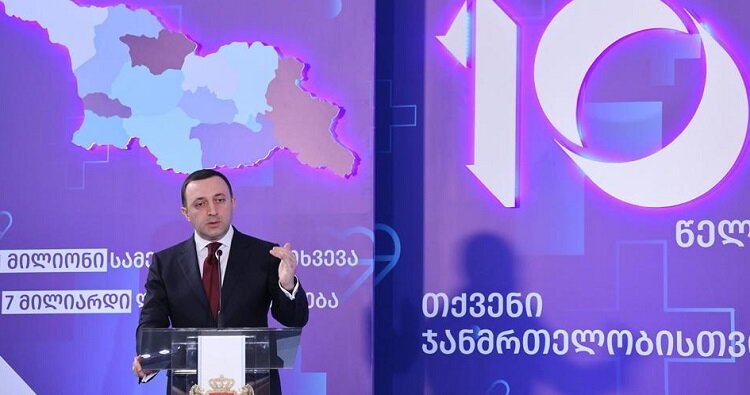Gov’t spent $2.7bln on healthcare programmes over past decade - PM

Georgian PM Irakli Garibashvili on Monday addressed an event marking an anniversary of the State Universal Healthcare Programme. Photo: Government press office
Irakli Garibashvili, the Prime Minister of Georgia, on Monday said the Government funding of domestic healthcare programmes had hit ₾7 billion ($2.7 billion) over the past 10 years, in comments marking an anniversary of the State Universal Healthcare Programme.
The head of the Government said the 2012 initiative by Bidzina Ivanishvili, the founder of the ruling Georgian Dream party and the former Prime Minister, had allowed 94 percent of the country’s population to have access to various medical services, contrasting the figure with “only 40 percent” under the previous United National Movement Government.
From ₾450 million ($173 mln) in 2012 - when the Georgian Dream took office - the healthcare sector budget has increased to almost ₾1.5 billion ($575 mln) this year, which, of course, is great progress”, Garibashvili said.
Pointing to the “very little funding” for private clinics under UNM, the PM said the venues had received 97 percent of budget funds allocated as part of the Programme over the past 10 years, totalling almost ₾6.8 billion ($2.6 billion).
In addition, private clinics also received ₾1 billion ($383 million) during the coronavirus pandemic between 2020 and 2022 to “ensure treatment for all Georgian citizens”, he said, adding the support had proved a “great help” for the medical facilities.
Today the Government marked the anniversary of the State Universal Healthcare Programme officially launched in 2013.
The Government had ₾350 million ($134 mln) in referral services for the country’s population over the past decade in addition to the specific Programme, of which ₾50 million ($19 mln) were spent on treatment of the country’s citizens abroad, he also noted.
The Government-initiated Solidarity Fund, set up in 2014 to collect donations for children suffering from cancer, also raised ₾25 million ($10 mln) for their treatment abroad in the same period, Garibashvili said, adding the figure brought the total spending of citizens abroad to ₾75 million ($29 mln).
Contrasting efforts of the previous authorities that spent about ₾70 million ($27 mln) in annual funding for citizens’ healthcare between 2004-2012, the PM said their spending would have amounted to ₾700 million ($268 mln) for state-funded healthcare programmes by 2022 if UNM had remained in power, instead of the ₾7 billion ($2.7 billion).
He also said “no preventive healthcare programmes” had been present in the country until 2012, in comments praising the efforts of the current authorities in advancing the Hepatitis C Elimination Programme in 2015 and taking actions to ensure financial aid for cancer patients.
Only a few patients [under the UNM Government] had access to anticancer medication. There were many challenges in this sector. Our citizens had to sell their houses and cars to receive basic healthcare services in this direction. In fact, they were completely abandoned by the state”, he said.
Garibashvili also noted quality healthcare still remained a challenge in the country, adding “much has been done for this, but there is much more to be done”.
 Tweet
Tweet  Share
Share